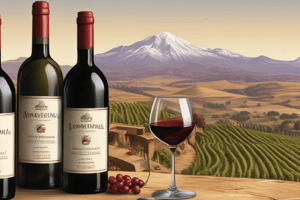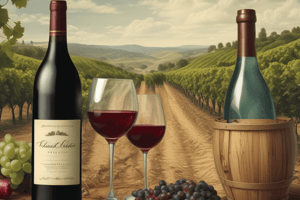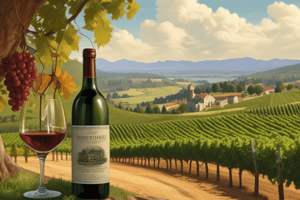Podcast
Questions and Answers
Scientific evidence indicates that people can be grouped into 4 groups of tasting profiles known as ____ , ____ , ____ , ____.
Scientific evidence indicates that people can be grouped into 4 groups of tasting profiles known as ____ , ____ , ____ , ____.
Sweet, hyper-sensitive, sensitive, tolerant
What are examples of production areas that influence wine flavor and aromas?
What are examples of production areas that influence wine flavor and aromas?
Vineyard: terroir, climate; Winery: fermenting, aging; Post Production: care, storage.
The basic general formula for how wine is made = sugar + yeast = alcohol and _________.
The basic general formula for how wine is made = sugar + yeast = alcohol and _________.
Carbon Dioxide
What are the basic steps in tasting wine?
What are the basic steps in tasting wine?
Why should you use a large glass in tasting wine?
Why should you use a large glass in tasting wine?
What does 'thrilling' refer to in wine tasting?
What does 'thrilling' refer to in wine tasting?
What are you looking at when studying wine appearance?
What are you looking at when studying wine appearance?
What is the difference between Aroma and Bouquet in describing the smell of a wine?
What is the difference between Aroma and Bouquet in describing the smell of a wine?
What are examples of chemical compounds associated with aromas in wines or juices?
What are examples of chemical compounds associated with aromas in wines or juices?
Would you expect white wines to be high in tannins and tanninic acid?
Would you expect white wines to be high in tannins and tanninic acid?
What does the presence of crystals in a white wine bottle or cork indicate?
What does the presence of crystals in a white wine bottle or cork indicate?
What are common faults derived from the usage of cork and oak barrels?
What are common faults derived from the usage of cork and oak barrels?
What common color traits will you see with young versus old or mature wines?
What common color traits will you see with young versus old or mature wines?
What variety is associated with floral/tropical aromas and taste?
What variety is associated with floral/tropical aromas and taste?
What are the recommended temperatures for storing and serving various wines?
What are the recommended temperatures for storing and serving various wines?
What percentage of the entire wine market does the USA attract?
What percentage of the entire wine market does the USA attract?
Leif Erickson called our country _______________ when he arrived.
Leif Erickson called our country _______________ when he arrived.
What grape species was important in the history of wine in Europe?
What grape species was important in the history of wine in Europe?
How many years can wine production in Europe be dated back?
How many years can wine production in Europe be dated back?
A recent research study found remnants of a winery dated to 6100 BC in which modern country?
A recent research study found remnants of a winery dated to 6100 BC in which modern country?
What was the impact of the Roman Catholic Church on wine production and viticulture in Europe?
What was the impact of the Roman Catholic Church on wine production and viticulture in Europe?
Who were Dom Perignon, Jean Chaptal, Napoleon, and Louis Pasteur, and what did they contribute to the wine industry?
Who were Dom Perignon, Jean Chaptal, Napoleon, and Louis Pasteur, and what did they contribute to the wine industry?
What are the top five wine-producing countries in the world?
What are the top five wine-producing countries in the world?
What is the general health benefit of moderate wine consumption?
What is the general health benefit of moderate wine consumption?
Can alcohol cause cancer?
Can alcohol cause cancer?
What affects BAC (Blood Alcohol Content) levels?
What affects BAC (Blood Alcohol Content) levels?
The threshold for commercial drivers (driving while on the job) is _______.
The threshold for commercial drivers (driving while on the job) is _______.
What is Terroir?
What is Terroir?
What are the four categories of grape varieties?
What are the four categories of grape varieties?
What is Phylloxera?
What is Phylloxera?
White wine is made by fermenting without the skins and cool temperature, and red wine is made by fermenting with skins and at __________ temperature.
White wine is made by fermenting without the skins and cool temperature, and red wine is made by fermenting with skins and at __________ temperature.
What is 'toasting' in barrels?
What is 'toasting' in barrels?
How do winemakers control the process of fermentation?
How do winemakers control the process of fermentation?
What do winemakers check to know when it is time to harvest?
What do winemakers check to know when it is time to harvest?
Do twist caps allow for any oxidation of wine?
Do twist caps allow for any oxidation of wine?
Wine aged in oak barrels is done to ______________.
Wine aged in oak barrels is done to ______________.
Flashcards are hidden until you start studying
Study Notes
American Wine Consumption
- American wine consumption stands at 8 liters per year, significantly lower than Italy's 50+ liters.
- The USA captures approximately 27.5% of the entire global wine market.
Historical Contributions
- Leif Erickson referred to North America as "Vineland" around 1000 AD due to the proliferation of wild grapes.
- Europe has evidence of wine production dating back 8,000 years, primarily associated with the Vitis Vinifera grape species.
- The Transcaucas Mountains near Georgia have yielded fossil records of ancient grape vines.
- The Greeks initially introduced wine production techniques to France around 600 BC, before the Romans expanded it.
Impact of the Catholic Church
- The Catholic Church greatly influenced wine production from AD 700, declaring that cathedrals should sustain their own vineyards by the Council of Aachen in 816.
- Wine became integral to Christian rituals, leading to extensive vineyard establishment across Europe.
Key Figures in Wine History
- Dom Perignon: Innovated cork stoppers leading to the sparkling wine of Champagne.
- Jean Chaptal: Developed "chaptalization," a method of adding sugar to increase alcohol content.
- Napoleon: Reformed inheritance laws affecting vineyard ownership distribution.
- Louis Pasteur: Explained fermentation science and yeast's role in winemaking.
Major Wine-Producing Countries
- Top five global wine producers include France, Italy, Spain, the United States, and Argentina.
California Wine History
- Father Junipero Serra initiated California's wine production, using the 'Mission' grape variety.
Michigan Wine Industry
- The industry began in the southwestern region, with concord as the foundational grape variety.
Factors Influencing Wine Production
- Romans grew grapes by utilizing trellises, food pairing techniques, and selecting high-quality grape varieties.
- Terroir defines how local natural elements affect the characteristics of wine.
- Quality of grape soil should be deep and rocky to support root activity.
- Slope and elevation facilitate drainage of cold air and excessive rainfall.
Viticulture Challenges
- Phylloxera is a devastating grapevine pest, mitigated by using resistant rootstocks.
- Pierce's disease, spread by the glassy-winged sharpshooter, threatens grape production in Southern California.
Wine Quality Factors
- Cool climates yield high acid, low sugar, and aromatic wines, while warm climates produce low acid, high sugar wines.
- Crop load management is crucial, as excessive yields can dilute grape quality.
Winemaking Process
- White wine is fermented without skins; red wine involves skins and is done at room temperature.
- Sulfur dioxide preserves wine and prevents unwanted fermentation.
- Grape juice containing pulp is called must; low sugar juice may undergo chaptalization to boost sugar levels.
Fermentation Details
- "Racking" separates wine from sediment during production.
- Malolactic fermentation converts malic acid to lactic acid for a smoother flavor.
- Grapes are handpicked in cool conditions to ensure quality.
Tasting Factors
- The 5 senses involved in wine tasting are vision, olfaction (smell), touch, chemical factors, and appearance.
- Color and clarity are key visual attributes to assess in wine.
Physical Responses to Alcohol
- Blood alcohol levels (BAC) are affected by factors including body weight, time consumed, and food intake.
- Moderate wine consumption is associated with potential health benefits, including reduced heart disease risks and improved cholesterol levels.
- The "French Paradox" highlights health benefits from red wine consumption despite high-fat diets.
Wine Preservation and Packaging
- Corks can harbor TCA, which detracts from wine quality, while twist caps prevent oxidation.
- Oak barrels enhance wine through slow oxygenation, though many white wines are aged in stainless steel.
These notes cover the essential aspects of American wine consumption, historical contributions, wine production factors, viticulture challenges, winemaking processes, health implications, and sensory evaluations.### Wine Tasting Profiles
- People can be categorized into four tasting profiles: Sweet, Hyper-sensitive, Sensitive, Tolerant.
- Most women tend to fall into the Sweet profile.
Wine Production Influences
- Wine flavor and aromas are affected in three stages:
- Vineyard: influenced by terroir, climate, and soil.
- Winery: includes processes like fermenting and aging.
- Post Production: involves care during storage and handling of wine.
Wine Composition
- Basic formula for wine production: sugar + yeast = alcohol + carbon dioxide.
Wine Tasting Process
- Steps in tasting wine: See, Swirl, Sniff (repeat), Sip, Slurp, Swish, Swallow/Spit.
Importance of Glassware
- Using a large glass helps to direct aromas to the nose, enhancing the tasting experience.
- A narrowing rim concentrates aromas for a better sensory experience.
Thrilling Experience in Tasting
- The term "thrilling" refers to allowing wine to enter the retro-nasal cavity, aerating, warming, and engaging taste receptors across the soft palate.
Evaluating Wine Appearance
- Key components to assess: clarity and color of the wine to determine its quality.
Aroma vs. Bouquet
- Aroma: characteristics derived from the grape variety.
- Bouquet: complex compounds developed through the winemaking process, often indicating maturity.
Aroma-Associated Compounds
- Examples of compounds include tannins which can cause a drying sensation; notes of green bananas, red wines, persimmon, and teas can be observed.
Tannins in Wines
- White wines are generally low in tannins; red wines are high in tannins, contributing to their aging potential.
- Sediment in red wine indicates the aging process, which involves the binding of tannins to proteins.
Acidity in Wine
- A still wine lacking in acidity is considered flat.
Oxidized Wine Characteristics
- Smell of rotten apple is often indicative of oxidized wine, which can be intentional in products like Sherry.
Methoxypyrazine in Grapes
- This compound produces a strong green/pepper smell and can be influenced by vineyard practices, particularly inadequate light exposure to vines.
Wine Crystals
- Crystals in white wine, formed during cold stabilization, are not harmful to drink and indicate proper winemaking techniques.
Common Wine Faults
- Common faults related to cork and oak barrels include poor hygiene, improper exposure to oxygen/sulphur, excessive maceration, faulty filtering/stabilization, and cork taint.
Color Traits in Wines
- Young white wines are clearer, while older wines may appear gold or brown, indicating aging.
- Red wines transition to reddish-brown when they are past their prime.
Wine Varieties with Floral Aromas
- Floral/tropical aromas and tastes are characteristic of grape varieties such as Riesling, Gewürztraminer, and Muscat.
Recommended Wine Storage and Serving Temperatures
- Red Wine:
- Storage Temp: 55-65°F
- Serving Temp: 65-75°F
- Rosé Wine:
- Storage Temp: 39-45°F
- Serving Temp: 45-55°F
- White Wine:
- Storage Temp: 39-45°F
- Serving Temp: 45-55°F
- Sparkling Wine:
- Storage & Serving Temp: 43-48°F
Studying That Suits You
Use AI to generate personalized quizzes and flashcards to suit your learning preferences.



